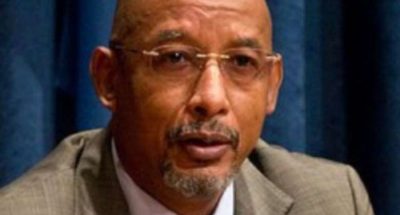Dr Ibrahim Mayaki, Chief Executive Officer of the African Union Development Agency, says African countries need to build their capacities to indep
Dr Ibrahim Mayaki, Chief Executive Officer of the African Union Development Agency, says African countries need to build their capacities to independently verify climate change figures than rely on data from developed countries.
“It is important for us, as we join our efforts to agree on a coherent framework to assess countries progress towards the natural development plans under agenda 2030. We should have clarity on how we make progress,” he said.
Dr Mayaki was speaking during a webinar organized by the Africa Centre for Economic Transformation (ACET) and African Union Development Agency on the theme: “Climate change: Securing Africa’s future.”
The session was aimed at drawing on the perspectives on resilience, responsibility, accountability and the gendered impacts of climate to assess where Africa was in dealing with the climate challenge.
At the just ended COP26, African negotiators attempted to hold developed countries as the main contributors to the climate crisis accountable for their failure to deliver on the $100bn annual commitment in climate financing for developing countries,” he said.
The goals of the African Group of Negotiators included securing significantly higher financial commitments to help African countries achieve their Nationally Determined Contributions and to ensure that countries can build resilience.
Dr Mayaki said because adaptation had been largely ignored up to now within the negotiation table in favour of mediation, a key decision that summarizes countries commitment to address adaptation as a priority was an important point for Africa.
Mr Lesley Ndloru, CEO, Africa Risk Capacity Limited, said resilience was a very important piece to the discussions and it was about giving people on the continent the ability to bounce back from extreme climate shocks, which were increasing in frequency and severity.
“Capacity building is important, and the starting point is risk awareness of climate change, developing a contingency plan on how countries will deal with events when it happens and developing the necessary skills within the country to coordinate that skill and to utilize the sophisticated financial instruments in terms of managing their exposure,” he said.
Currently, he said, 20 to 30 million people on the African continent were covered by various insurance and social protection schemes. However, looking at the needs of Africa, two-thirds of the population’s economic activities could be impacted by extreme weather, so there was the need for a massive scaling up of insurance coverage.
“We still have a long way to go in terms of making prearranged financing more mainstream and accessible to all Africans that need it and being able to achieve this is extremely important for Africa to be able to emerge out of the poverty trap to be better able to deal with the climate shock which inevitably will become increasingly more frequent and severe,” the CEO added.
Mr Nick Westcott, Director Royal African Society, said “climate is the heart of everything we do and we make assumptions about it but it is increasingly evident that those assumptions are not true. We have it in mind that climate is changing and would continue to change and we have to take that into account.”
“This is important because it is people who are responding to the fact that climate is changing so we have to take into account in the policies that we develop that make Regional Corporation and integration which is central to this transformation crucial,” he said.
Mr Westcott said climate, conflict and demography in Africa were three things that could not be separated, adding that “Climate change exasperate conflicts, and we have to measure the impact of it, as Africa’s priority is actually to stop the path of change.”
“African governments must join up to do a lot among themselves within their governments. Go on an energy transition, focus on conserving the biodiversity, educate people to be aware and have the skills to adapt,” he said.

COMMENTS